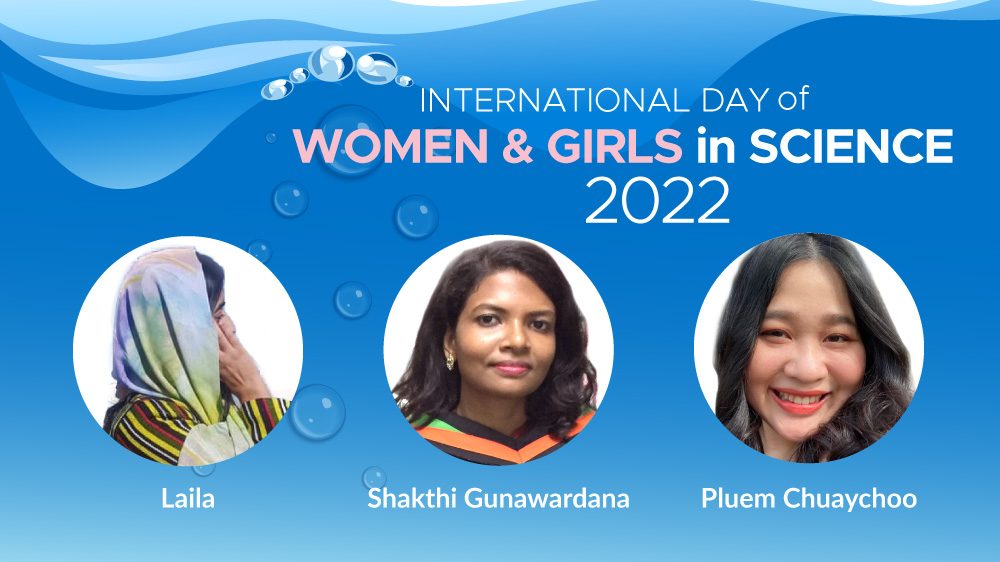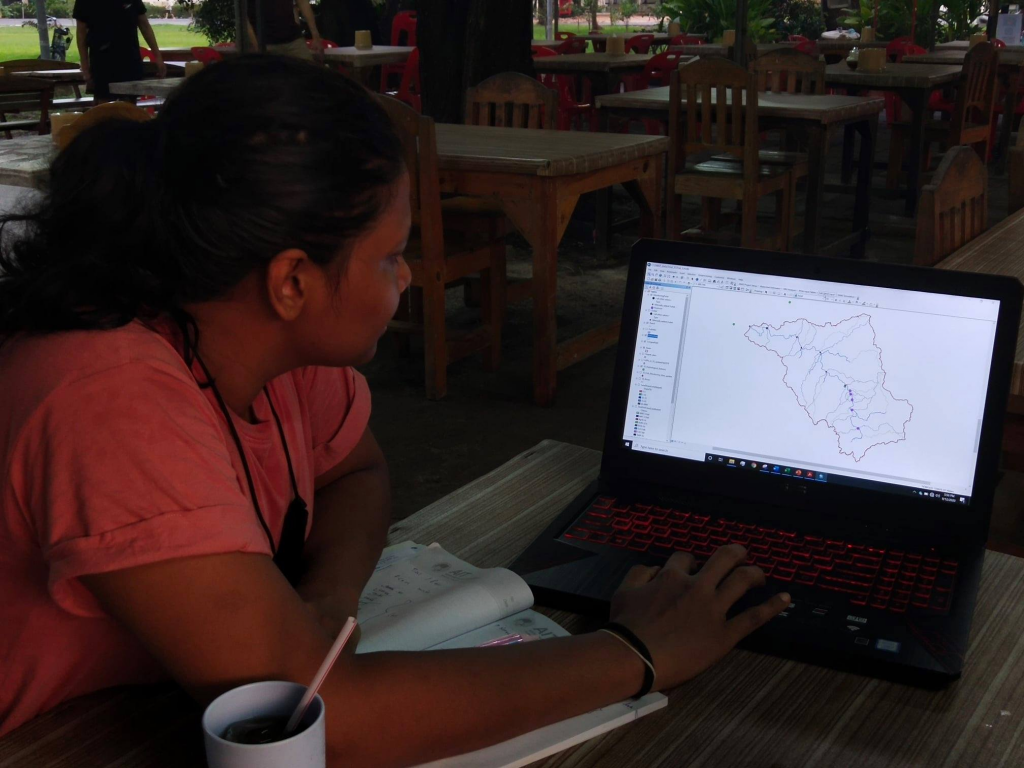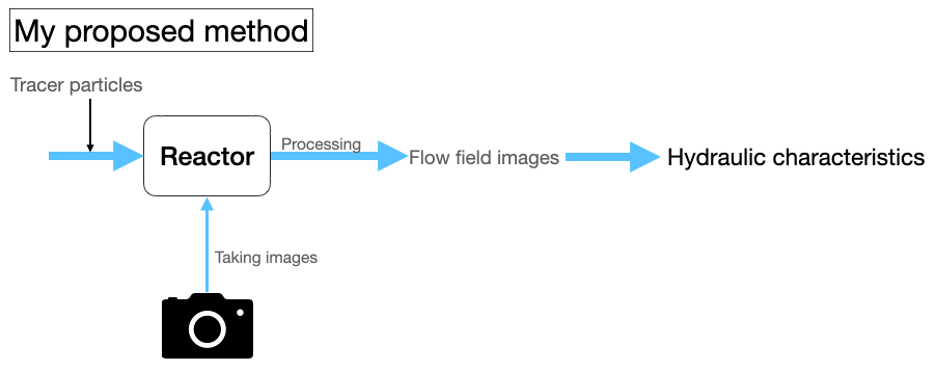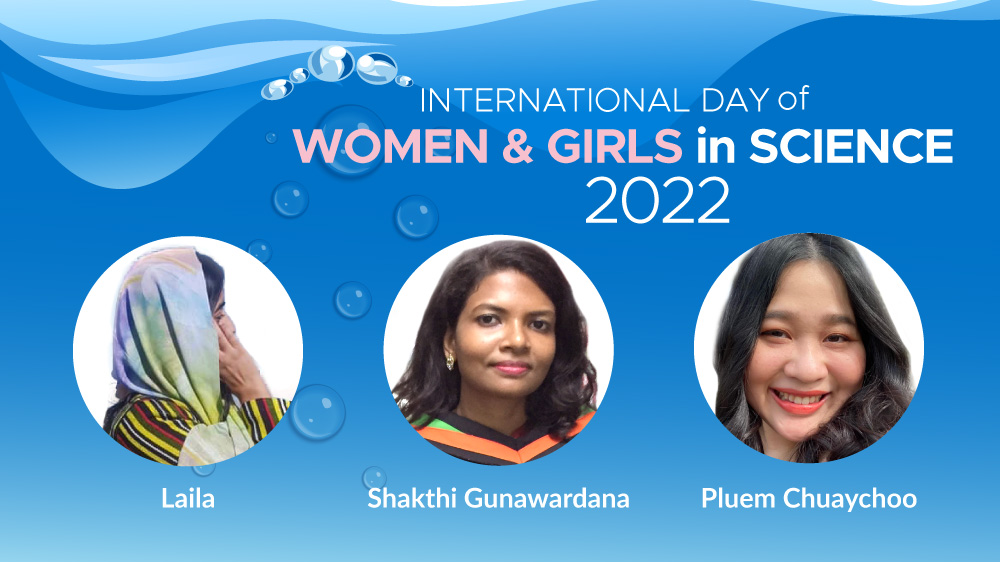By Mae Thiwari
February 11, 2022 -- The 7th International Day of Women and Girls in Science Assembly, held virtually on February 11, 2022, at the United Nations (UN) Headquarters in New Year, focuses on the role of women and girls in science as agents of change. With the theme of “Equity, Diversity, and Inclusion: Water Unites Us”, three of AIT engineering students from three different countries share inspirational stories of their personal journey and research that unite them as the agents of change to accelerate progress towards SDG6: Clean Water and Sanitation for All.

Billions of people around the world will be unable to access safely managed household drinking water, sanitation, and hygiene services in 2030 unless the rate of progress quadruples, according to the report released by the World Health Organization and UNICEF in July 2021. To accelerate the progress, three women engineers from Afghanistan, Sri Lanka and Thailand have joined the Asian Institute of Technology (AIT) to address various water and sanitation issues in support of sustainable development.
Pluem Chuaychoo, a Thai doctoral student in the Environmental Engineering and Management program, began her journey to improve sanitation by surprising her parents with her choice of education. “When I told my parents that I wanted to study engineering, they said “oh, but you’re a girl!”,” Pluem recalled. As the youngest and the only daughter, Pluem became interested in science when she noticed that she was good at it. “My parents didn’t stop me, but they were worried that it would be too physically demanding for a woman.” Adding that although there is still a common perception of gender role, she has never faced any discrimination or challenges in her field – either in the classroom and the field, she is as capable as her male peers.
 Different cultures and societies present different types and levels of barriers to women in science. For Shakthi Gunawardana, a PhD candidate from Sri Lanka, who will complete her doctoral degree in Water Engineering and Management in a few months, she welcomed the challenges. Similar to Pluem, Shakthi chose to focus on water engineering since her undergraduate level. Explaining that she was “interested and directed towards the field of science” from her childhood, Shakthi added that “The journey was not smooth, but the challenges helped shape my journey – just like the meanderings in a river.”
Different cultures and societies present different types and levels of barriers to women in science. For Shakthi Gunawardana, a PhD candidate from Sri Lanka, who will complete her doctoral degree in Water Engineering and Management in a few months, she welcomed the challenges. Similar to Pluem, Shakthi chose to focus on water engineering since her undergraduate level. Explaining that she was “interested and directed towards the field of science” from her childhood, Shakthi added that “The journey was not smooth, but the challenges helped shape my journey – just like the meanderings in a river.”
In a culture where challenges against women being active participants in the society are extreme, support from family and strong determination to defy passivity can help fuel the passion to become agents of change. Laila, a civil engineering graduate from Afghanistan who recently received AIT scholarship and Emeritus Professor Madan Mohan Das scholarship to study for a master’s degree in Water Engineering and Management, was encouraged at a very young age by her father to pursue a degree in engineering. “In Afghanistan, it is uncommon for women to be in civil engineering. My father motivated me to do something different, rather than doing what everyone else does.” Choosing to be different meant that she was one of only six female students among 150 men in her class. By the end of the program, she was one of only two women graduating with a degree in engineering – and she graduated with honors.
Studying to become an engineer in the society that does not value women’s contribution beyond informal sector was hard for Laila but finding a job that matched her skill was even harder. After months of searching, she landed a job at the National Water Affairs Regulation Authority where she quickly learned that “To reach the developmental goals in energy, agricultural, rural and urban sectors sustainably, the management of water resources is important.” Laila is hoping that the education and expertise provided by AIT will prepare her for the role of manager who can effectively “manage the water resources of our country, Afghanistan.”
In addition to contributing to national development through sound management of water resources, another woman engineer, Shakthi is working on the Mekong River – one of the world’s greatest rivers with richest fish diversity, second only to the Amazon River. Explaining how the rapid development of hydropower – to produce power for economic development, is taking its toll on the hydrology – consequently to the environment. “I am proposing optimum reservoir release scenarios for the future, such that the hydropower production and fish catch are maximized so as to minimize the impact on the environment.”
Both Laila and Shakthi are devoting their research to ensure that both economic and social development without negative impact to the environment is possible. With similar concern to the environment, but from different angle – Pluem’s research focuses on wastewater.

Pluem's Research
Where there is the need for clean water, there is also wastewater. Working on sanitation, Pluem is tackling a gap in the decentralized wastewater treatment system. Whereas the conventional method of hydraulic testing of wastewater treatment requires up to five times the volume of clean water per the size of the reactor, Pluem is proposing a method that combines computer science technology. “My research is trying to propose an alternative to the conventional tool to investigate hydraulic characteristics. It will be quicker, easier, and consume much less clean water to ensure the efficiency and effectiveness of a decentralized wastewater treatment unit.”
From three different countries and different backgrounds, the three young women engineers are united by their research interest in water – bringing to life the theme of this year’s International Day of Women and Girls in Science: “Equity, Diversity, and Inclusion: Water Unites Us”. With determination and education provided by AIT to tackle different aspects of clean water and sanitation, men and women can equally contribute actively to the sustainable development. Progress can be accelerated when no one capable is excluded.
Further readings:
International Day of Women and Girls in Science 2022
https://www.un.org/en/observances/women-and-girls-in-science-day
Water Engineering and Management Program
https://set.ait.ac.th/programs/civil-and-infrastructure-engineering/water-engineering-and-management-wem/
Environment Engineering and Management Program
https://serd.ait.ac.th/environmental-engineering-and-management-2/

